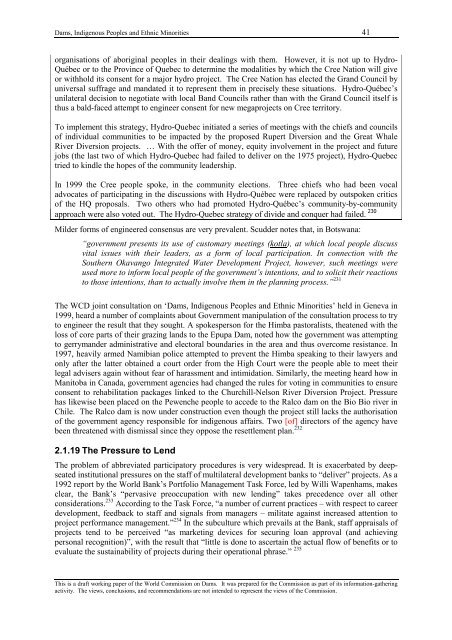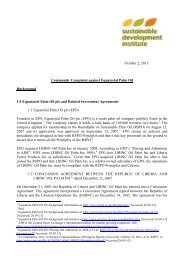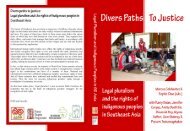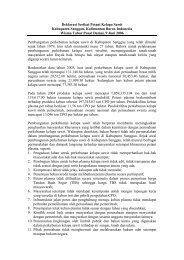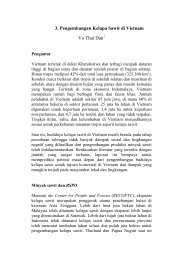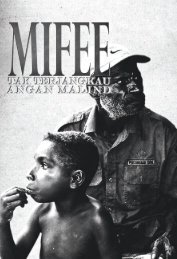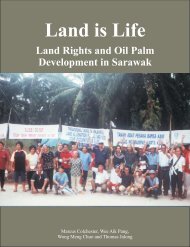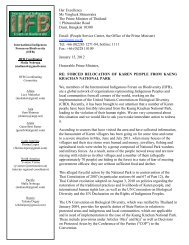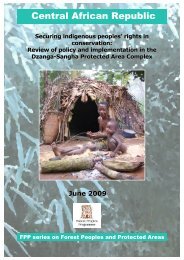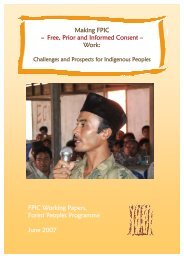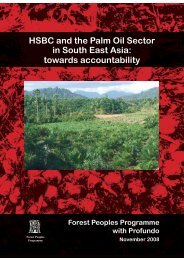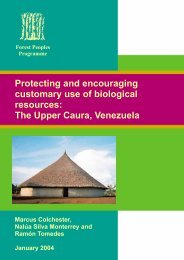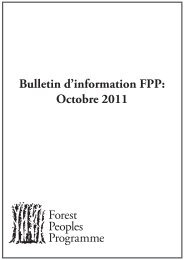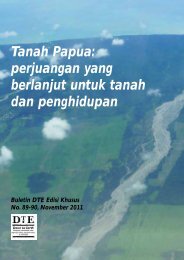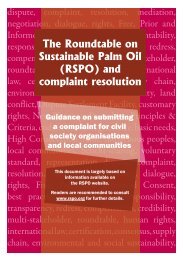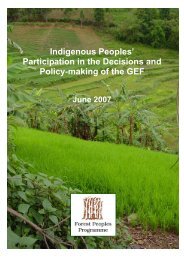Thematic Review II.2: Dams, Indigenous Peoples and Ethnic Minorities
Thematic Review II.2: Dams, Indigenous Peoples and Ethnic Minorities
Thematic Review II.2: Dams, Indigenous Peoples and Ethnic Minorities
You also want an ePaper? Increase the reach of your titles
YUMPU automatically turns print PDFs into web optimized ePapers that Google loves.
<strong>Dams</strong>, <strong>Indigenous</strong> <strong>Peoples</strong> <strong>and</strong> <strong>Ethnic</strong> <strong>Minorities</strong> 41<br />
organisations of aboriginal peoples in their dealings with them. However, it is not up to Hydro-<br />
Québec or to the Province of Quebec to determine the modalities by which the Cree Nation will give<br />
or withhold its consent for a major hydro project. The Cree Nation has elected the Gr<strong>and</strong> Council by<br />
universal suffrage <strong>and</strong> m<strong>and</strong>ated it to represent them in precisely these situations. Hydro-Québec’s<br />
unilateral decision to negotiate with local B<strong>and</strong> Councils rather than with the Gr<strong>and</strong> Council itself is<br />
thus a bald-faced attempt to engineer consent for new megaprojects on Cree territory.<br />
To implement this strategy, Hydro-Quebec initiated a series of meetings with the chiefs <strong>and</strong> councils<br />
of individual communities to be impacted by the proposed Rupert Diversion <strong>and</strong> the Great Whale<br />
River Diversion projects. … With the offer of money, equity involvement in the project <strong>and</strong> future<br />
jobs (the last two of which Hydro-Quebec had failed to deliver on the 1975 project), Hydro-Quebec<br />
tried to kindle the hopes of the community leadership.<br />
In 1999 the Cree people spoke, in the community elections. Three chiefs who had been vocal<br />
advocates of participating in the discussions with Hydro-Québec were replaced by outspoken critics<br />
of the HQ proposals. Two others who had promoted Hydro-Québec’s community-by-community<br />
approach were also voted out. The Hydro-Quebec strategy of divide <strong>and</strong> conquer had failed. 230<br />
Milder forms of engineered consensus are very prevalent. Scudder notes that, in Botswana:<br />
“government presents its use of customary meetings (kotla), at which local people discuss<br />
vital issues with their leaders, as a form of local participation. In connection with the<br />
Southern Okavango Integrated Water Development Project, however, such meetings were<br />
used more to inform local people of the government’s intentions, <strong>and</strong> to solicit their reactions<br />
to those intentions, than to actually involve them in the planning process.” 231<br />
The WCD joint consultation on ‘<strong>Dams</strong>, <strong>Indigenous</strong> <strong>Peoples</strong> <strong>and</strong> <strong>Ethnic</strong> <strong>Minorities</strong>’ held in Geneva in<br />
1999, heard a number of complaints about Government manipulation of the consultation process to try<br />
to engineer the result that they sought. A spokesperson for the Himba pastoralists, theatened with the<br />
loss of core parts of their grazing l<strong>and</strong>s to the Epupa Dam, noted how the government was attempting<br />
to gerrym<strong>and</strong>er administrative <strong>and</strong> electoral boundaries in the area <strong>and</strong> thus overcome resistance. In<br />
1997, heavily armed Namibian police attempted to prevent the Himba speaking to their lawyers <strong>and</strong><br />
only after the latter obtained a court order from the High Court were the people able to meet their<br />
legal advisers again without fear of harassment <strong>and</strong> intimidation. Similarly, the meeting heard how in<br />
Manitoba in Canada, government agencies had changed the rules for voting in communities to ensure<br />
consent to rehabilitation packages linked to the Churchill-Nelson River Diversion Project. Pressure<br />
has likewise been placed on the Pewenche people to accede to the Ralco dam on the Bio Bio river in<br />
Chile. The Ralco dam is now under construction even though the project still lacks the authorisation<br />
of the government agency responsible for indigenous affairs. Two [of] directors of the agency have<br />
been threatened with dismissal since they oppose the resettlement plan. 232<br />
2.1.19 The Pressure to Lend<br />
The problem of abbreviated participatory procedures is very widespread. It is exacerbated by deepseated<br />
institutional pressures on the staff of multilateral development banks to “deliver” projects. As a<br />
1992 report by the World Bank’s Portfolio Management Task Force, led by Willi Wapenhams, makes<br />
clear, the Bank’s “pervasive preoccupation with new lending” takes precedence over all other<br />
considerations. 233 According to the Task Force, “a number of current practices – with respect to career<br />
development, feedback to staff <strong>and</strong> signals from managers – militate against increased attention to<br />
project performance management.” 234 In the subculture which prevails at the Bank, staff appraisals of<br />
projects tend to be perceived “as marketing devices for securing loan approval (<strong>and</strong> achieving<br />
personal recognition)”, with the result that “little is done to ascertain the actual flow of benefits or to<br />
evaluate the sustainability of projects during their operational phrase.” 235<br />
This is a draft working paper of the World Commission on <strong>Dams</strong>. It was prepared for the Commission as part of its information-gathering<br />
activity. The views, conclusions, <strong>and</strong> recommendations are not intended to represent the views of the Commission.


